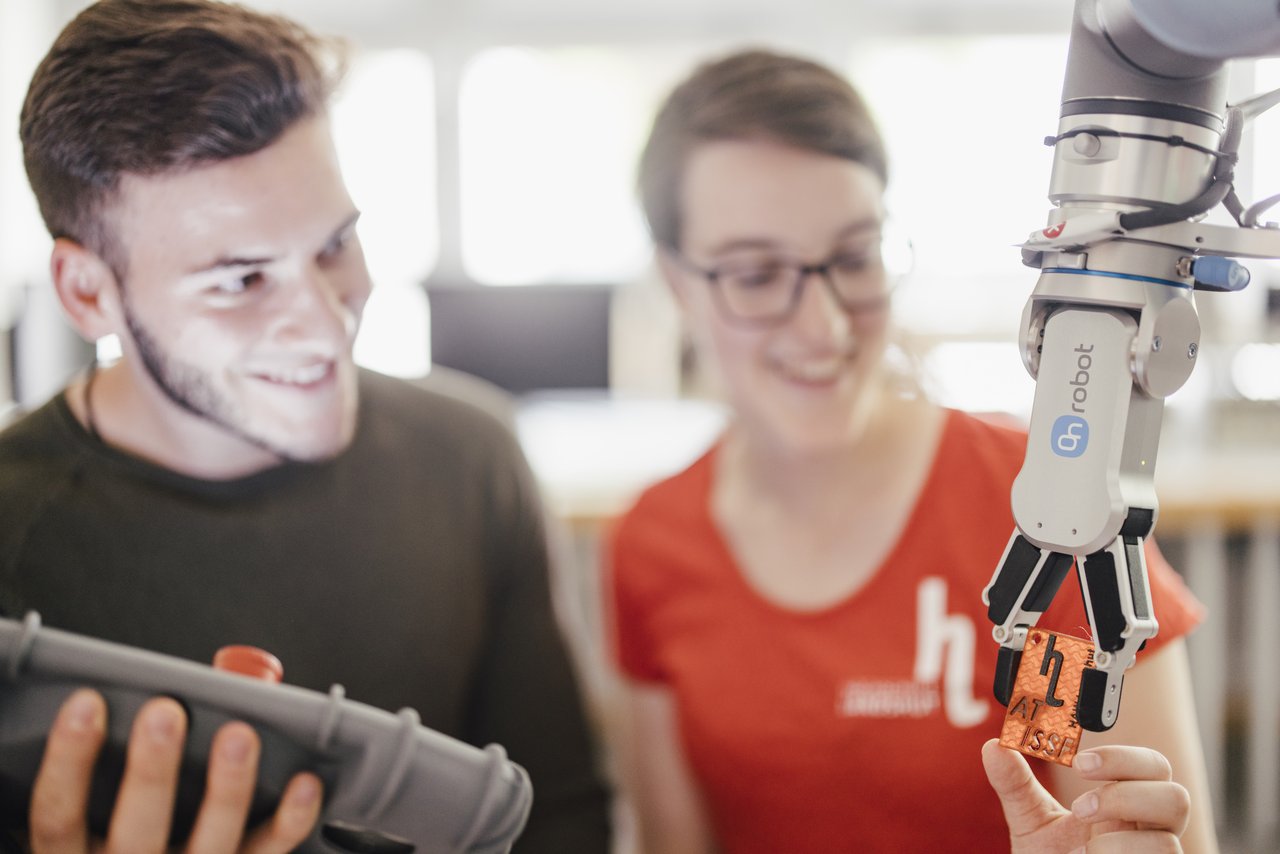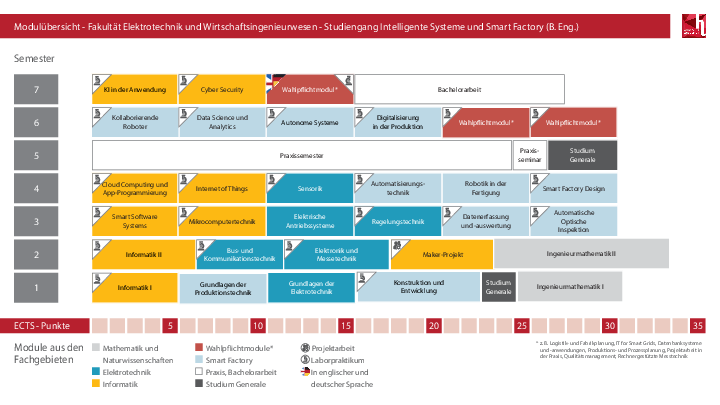
Intelligent systems and smart factory
Bachelor
The interdisciplinary user degree programme in Electrical Engineering, Computer Science and Production Engineering teaches students how to develop, set up and programme intelligent systems and how to use them to shape the production of tomorrow.
| Start | Winter semester |
|---|---|
| Admission Criteria | Unrestricted admission |
| Application period | 15.04.2025 - 15.07.2025 |
| Study format | Full time |
| Study cost | None (only semester fee) |
| Normal duration | 7 Semester |
| Language | German |
| ECTS | 210 |
Programme content
Digitalisation and the energy transition are constantly placing new demands on products: Photovoltaic systems, battery storage systems, cars, washing machines and many other systems need to "talk" to each other and interact with each other. There are also more and more autonomous devices such as robots for vacuuming or mowing the lawn. Students on this degree programme learn how such intelligent systems and products can be developed, constructed and programmed.
These products also need to be manufactured! The energy-efficient production of innovative products, which are also affordable and of high quality, requires a corresponding factory, the smart factory. The degree programme teaches how to make existing factories fit for tomorrow and how to optimally plan the production of tomorrow.
The course therefore focuses on and teaches the following areas in particular: programming, automation of production, digitalisation of factory operations, AI, cyber security, embedded systems, IoT and cloud.
The degree programme also impresses with its high practical orientation, as the focus is on the application and further development of existing technologies.

Study programme
The Bachelor's degree programme comprises six theoretical semesters with lectures and laboratory practicals as well as a practical semester. A total of 210 ECTS credits are earned. The degree programme has a modular structure and also allows students to develop their own individual profile in the specialisation programme with compulsory elective modules.
The 1st and 2nd semesters lay the foundation for the very broad programme. In addition to the few theoretical subjects, application-oriented work is carried out right from the start (e.g. in the Maker Project), supplemented by many internships (e.g. programming and CAD).
The 3rd and 4th semesters serve to deepen and expand the knowledge acquired so far in the areas of software, embedded systems (e.g. Raspberry Pi and Arduino) and production automation (PLC, AOI, robotics).
The 5th semester is the internship semester in industry. It comprises at least 80 working days in the internship company and can be completed in Germany or abroad. (Further information can be obtained from the work placement officer). The practical work is accompanied by a practical seminar organised by the university.
The specialisation modules from various areas of intelligent systems and the smart factory take place in the 6th and 7th semesters. In addition, three compulsory elective modules (e.g. logistics and factory planning, quality management) allow students to specialise individually.
The Bachelor's thesis is completed during the specialisation programme.
The programme concludes with the Bachelor's thesis, which usually takes two months and is awarded 12 ECTS credits.
Modules
Basic and advanced modules in the 1st-4th semester from the fields of electrical engineering, computer science and smart factory (production technology) as well as mathematics and natural sciences (examples):
Bus and communication technology, computer science, maker project, electrical engineering and measurement technology, control engineering, cloud computing, Internet of Things, electrical drive systems, robotics in production, automation technology, engineering mathematics
Practical phase in the 5th semester:
Practical time in the company, practical seminar, Studium Generale
Specialisation studies in the 6th and 7th semesters (examples):
Smart factory modules: collaborative robots, autonomous systems, data science and analytics, digitalisation in production
Computer science modules: AI in application, cyber security, remote technologies and app programming
Elective modules: e.g. logistics and factory planning, IT for smart grids, database systems and applications, production and process planning, project work in practice, quality management,
Practical orientation
All degree programmes at the Faculty of Electrical and Industrial Engineering are characterised by a high degree of practical and application orientation.
In addition to the theoretical lectures, many of the modules on offer include laboratory practicals with specific content. In these, the theoretical knowledge acquired is tested, expanded and consolidated in practice in our more than 20 modern laboratories. Project work also serves to creatively and practically implement what has been learnt.
In the 5th semester, students also complete a practical semester of at least 80 working days in a company of their choice in Germany or abroad.




